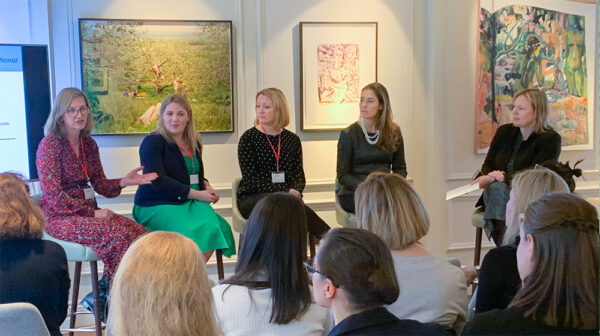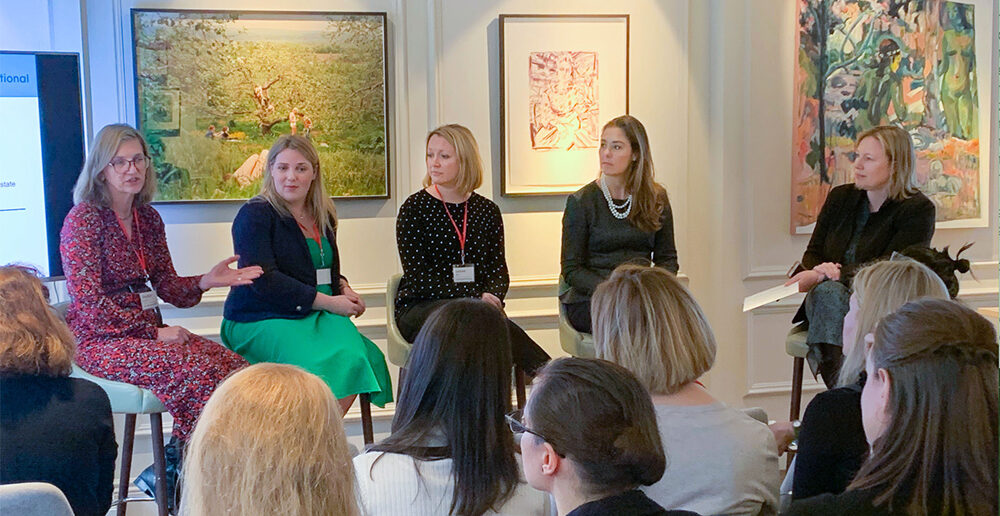« If you make the real estate industry better and fairer for women, you make it better and fairer for everyone », says Andrea Carpenter, director of Diversity Talks Real Estate, which helps under-represented groups find a place on the speakers’ platform at industry events.
There is no doubt that the call to make the real estate industry “better and fairer” is being heard. Some 43% of real estate companies in Europe employ a professional dedicated purely to ‘diversity, equity and inclusion’, according to the Global Real Estate DEI survey.
The question remains, though: is enough being done? … Especially at a time when the industry business model is changing, and the ‘walls’ falling between the real estate professional and the ‘people’ and ‘communities’ – rather than the more inanimate term, ‘end user’ – who use the built environment.
Making the industry better and fairer for all is about having the right framework and the right culture, says Carpenter. And the cost of not taking action? Companies failing to take heed of the changes are likely to see their investments become less resilient in the longer term.
If you all come from the same group, you can’t solve the urban problems for a group that is very different to you – Andrea Carpenter, Diversity Talks Real Estate
This move towards a more people-centric business model has required the industry to bring in new skill sets and a wider range of people. The industry can only make the places that it creates and manages more “vibrant and moving” by expanding the diversity of thought and vision, describes Carpenter.
“You need to reflect your customer base,” Carpenter explains. “If you all come from the same group, you can’t solve the urban problems for a group that is very different to you. You have no understanding. You don’t have their lived experience.”
The rise of sustainability towards the top of the corporate agenda has also added a further “layer” to the skill sets needed by any real estate company.
“All the [real estate]world’s a stage”
Diversity Talks Real Estate grew out of Women Talk Real Estate (WTRE), which was set up in 2017. The focus of the organisation still rests on its founding principles of building a database of under-represented professionals, mainly women, looking to speak at industry events. It’s about providing role models and challenging stereotypes.

The Speakers’ Café event organised by Diversity Talks Real Estate, with Andrea Carpenter far right.
“We recognise that the stage is a very powerful place,” and helping women onto the stage is a “very practical and a very measurable way to make a difference”, says Carpenter. So far, over 335 different women have received 845 speaking invitations to industry events, ranging from MIPIM to events organised by the likes of the Urban Land Institute, INREV and Swedish media group Fastighetsnytt.
If you’re from an under-represented group and want to harness the power of the platform, then come to us. We will support you – Andrea Carpenter, Diversity Talks Real Estate
Many of the women are based in the UK, a growing number come from the rest of Europe, and those in North America and Asia have global roles. Speakers listed include the likes of: Henri Vuong, head of debt investment research at PGIM; Henrike Waldburg, head of investment management – retail at Union Investment Real Estate; and Bronny Wilson, regional head for UK & Ireland at Equiem.
The move to become Diversity Talks Real Estate came naturally, says Carpenter, as the organisation broadened their scope to represent all under-represented groups, in particular those from ethnic minority backgrounds. “If you’re from an under-represented group and want to harness the power of the platform, then come to us. We will support you,” says Carpenter
Regarding Diversity Talks Real Estate, Carpenter says: “It’s a simple tool. It is not going to solve the whole issue, but if you see someone on stage, you’re going to be remembered, which helps with your own visibility and your own career.”
How to bring more gender parity to the industry
Author Caroline Criado Pérez writes in her book Invisible Women that the habit of “seeing men as the human default” not only runs deep – “as deep as theories of human evolution” – but it has also been “fundamental to the structure of human society”.
Change needs to come from changing the framework and the culture … one step at a time, adds Carpenter.
The upper echelons still do not have many women, and we struggle with the pipeline of women through the middle of the sector – Andrea Carpenter, Diversity Talks Real Estate
“Most companies are in quite early stages of diversity. The upper echelons still do not have many women, and we struggle with the pipeline of women through the middle of the sector,” points out Carpenter.
According to the Global Real Estate DEI Survey, women represent only 14% of board roles in Europe, compared with 26% in Asia Pacific and 21% in North America.
For those companies starting out in the creation of a more diverse, equal and inclusive workforce, Carpenter advises as a first step to focus on areas where they feel most comfortable, which is usually around recruitment.
Giving a space to women requires flexibility and time
“It’s about having the flexibility to understand, and taking the time to understand, what types of women you are attracting,” explains Carpenter.
“Some women might be very ambitious, and others may be more content to be an expert in their subject matter. This is no different to the men you want to attract.
These types of practices will then start bringing in a whole new churn of better understanding that can lead to other more proactive initiatives – Andrea Carpenter, Diversity Talks Real Estate
“You can make a positive change by ensuring that you do a wide enough search to get your long list and short list as representative as you can.
“These types of practices will then start bringing in a whole new layer of understanding that can lead to other more proactive initiatives.”
Another early step is to look at parental leave. “It’s not about maternity leave any more. It’s about looking at the total package that you offer employees.”
After 25 years in real estate, Carpenter has seen colleagues and friends from her early days rise to board level. She is heartened by the fact that many of them are now very aware of the need to bring diversity to the workplace.
“Many are men from that typical universe that we expect to be in property, but they are so mindful of the issue of diversity, and so keen to correct this and make the industry a more inclusive place,” says Carpenter.
How women’s networking events have moved on
MIPIM World asked Carpenter about the importance of women’s networking events. “Ten years ago, women’s networking events were a way to escape from the crowds of men,” she replies. Now there is a “new set of rules”.
There are as many men championing the issue of diversity and inclusion as women. We want to make sure they’re with us, in the same room – Andrea Carpenter, Diversity Talks Real Estate
“Women get a lot of business done at these events and they make useful connections. They are also about women recognising: ‘I can introduce you to someone’ or ‘that’s interesting, let’s talk about it next week’. There is a real camaraderie around women helping women.”
Carpenter also welcomes men at such events. “There are as many men championing the issue [of diversity and inclusion]as women. We want to make sure they’re with us, in the same room.”
When you look into a room and it’s a wall of men, you have to take a deep breath before you go in. It’s like, ‘right, here we go again – Andrea Carpenter, Diversity Talks Real Estate
Women’s networking events are also a “refreshing change”, she adds. “When you look into a room and it’s a wall of men, you have to take a deep breath before you go in. It’s like, ‘right, here we go again’.
“Women subconsciously know that the real estate industry has been built around men, so every time such an experience reinforces that real estate is an industry dominated by men,” she explains.
The role of face-to-face networking
Towards the end of the interview, MIPIM World talked with Carpenter about how much we had all missed face-to-face networking over the Covid lockdowns.
“We’ve had a period of crisis when we needed information,” Carpenter says. “People wanted to be online, listening to what experts thought. We are now moving into that phase when we are missing the networking and the getting new business.”
Video calls are just not the same, we both decided. As Gianpiero Petriglieri, associate professor at INSEAD, said about conference call fatigue: “Our minds are together when our bodies feel we’re not. That dissonance, which causes people to have conflicting feelings, is exhausting. You cannot relax into the conversation naturally.”
A positive from the Covid lockdowns is that the diversity agenda has been accelerated, says Carpenter. “We’ve all seen how people have had to cope in different ways through different crises, and what that has meant for their work-life balance.”
So, here’s to meeting up all together, face to face, at MIPIM 2022 in Cannes.
You may also be interested in some articles about Diversity:
How inlusion & diversity opens up innovation
Tackling diversity and inclusion in commerical real estate



